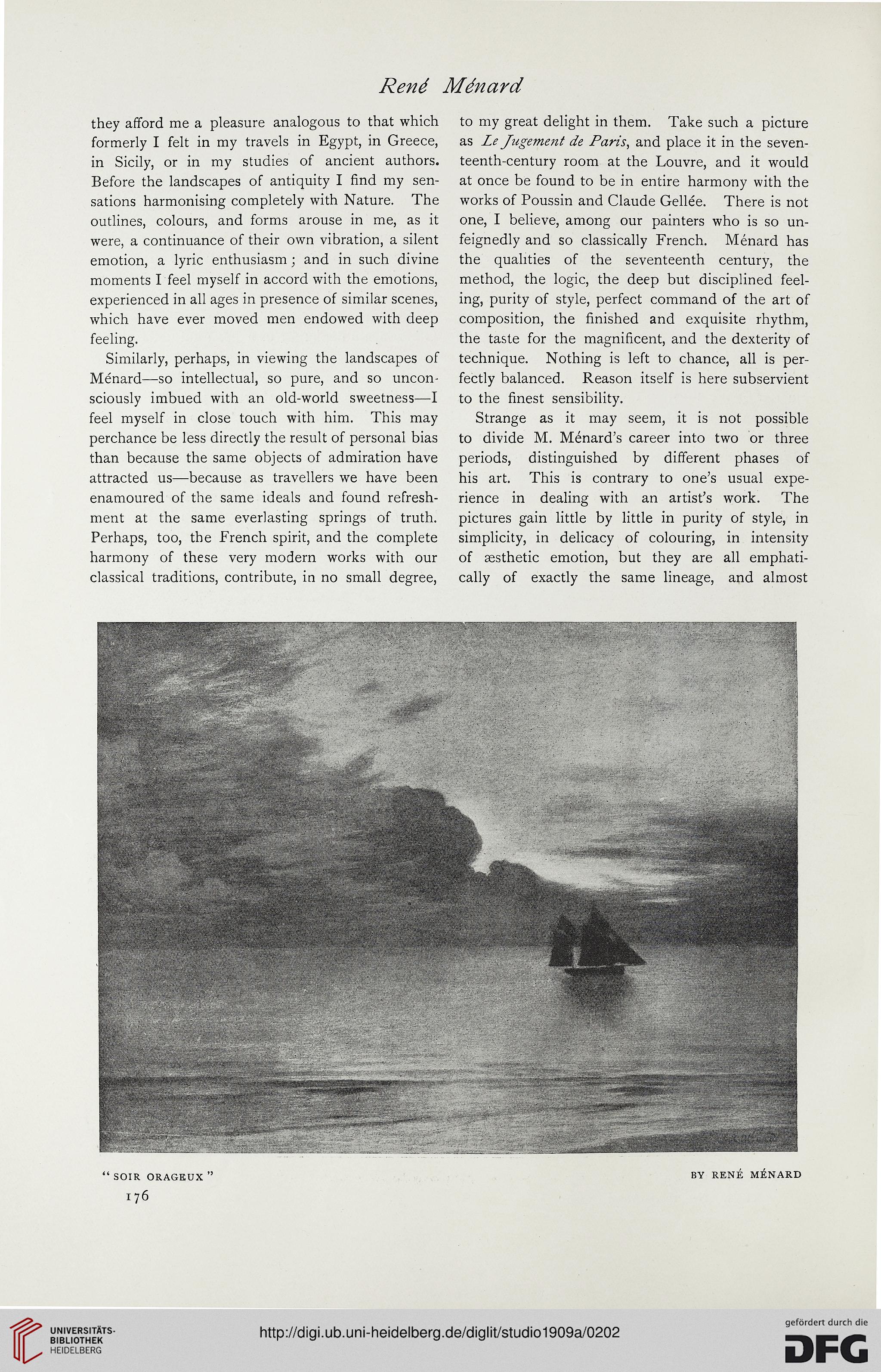Rend Mdnard
they afford me a pleasure analogous to that which
formerly I felt in my travels in Egypt, in Greece,
in Sicily, or in my studies of ancient authors.
Before the landscapes of antiquity I find my sen-
sations harmonising completely with Nature. The
outlines, colours, and forms arouse in me, as it
were, a continuance of their own vibration, a silent
emotion, a lyric enthusiasm; and in such divine
moments I feel myself in accord with the emotions,
experienced in all ages in presence of similar scenes,
which have ever moved men endowed with deep
feeling.
Similarly, perhaps, in viewing the landscapes of
Menard—so intellectual, so pure, and so uncon-
sciously imbued with an old-world sweetness—I
feel myself in close touch with him. This may
perchance be less directly the result of personal bias
than because the same objects of admiration have
attracted us—because as travellers we have been
enamoured of the same ideals and found refresh-
ment at the same everlasting springs of truth.
Perhaps, too, the French spirit, and the complete
harmony of these very modern works with our
classical traditions, contribute, in no small degree,
to my great delight in them. Take such a picture
as Le Jugement de Paris, and place it in the seven-
teenth-century room at the Louvre, and it would
at once be found to be in entire harmony with the
works of Poussin and Claude Gellee. There is not
one, I believe, among our painters who is so un-
feignedly and so classically French. Menard has
the qualities of the seventeenth century, the
method, the logic, the deep but disciplined feel-
ing, purity of style, perfect command of the art of
composition, the finished and exquisite rhythm,
the taste for the magnificent, and the dexterity of
technique. Nothing is left to chance, all is per-
fectly balanced. Reason itself is here subservient
to the finest sensibility.
Strange as it may seem, it is not possible
to divide M. Menard’s career into two or three
periods, distinguished by different phases of
his art. This is contrary to one’s usual expe-
rience in dealing with an artist’s work. The
pictures gain little by little in purity of style, in
simplicity, in delicacy of colouring, in intensity
of sesthetic emotion, but they are all emphati-
cally of exactly the same lineage, and almost
they afford me a pleasure analogous to that which
formerly I felt in my travels in Egypt, in Greece,
in Sicily, or in my studies of ancient authors.
Before the landscapes of antiquity I find my sen-
sations harmonising completely with Nature. The
outlines, colours, and forms arouse in me, as it
were, a continuance of their own vibration, a silent
emotion, a lyric enthusiasm; and in such divine
moments I feel myself in accord with the emotions,
experienced in all ages in presence of similar scenes,
which have ever moved men endowed with deep
feeling.
Similarly, perhaps, in viewing the landscapes of
Menard—so intellectual, so pure, and so uncon-
sciously imbued with an old-world sweetness—I
feel myself in close touch with him. This may
perchance be less directly the result of personal bias
than because the same objects of admiration have
attracted us—because as travellers we have been
enamoured of the same ideals and found refresh-
ment at the same everlasting springs of truth.
Perhaps, too, the French spirit, and the complete
harmony of these very modern works with our
classical traditions, contribute, in no small degree,
to my great delight in them. Take such a picture
as Le Jugement de Paris, and place it in the seven-
teenth-century room at the Louvre, and it would
at once be found to be in entire harmony with the
works of Poussin and Claude Gellee. There is not
one, I believe, among our painters who is so un-
feignedly and so classically French. Menard has
the qualities of the seventeenth century, the
method, the logic, the deep but disciplined feel-
ing, purity of style, perfect command of the art of
composition, the finished and exquisite rhythm,
the taste for the magnificent, and the dexterity of
technique. Nothing is left to chance, all is per-
fectly balanced. Reason itself is here subservient
to the finest sensibility.
Strange as it may seem, it is not possible
to divide M. Menard’s career into two or three
periods, distinguished by different phases of
his art. This is contrary to one’s usual expe-
rience in dealing with an artist’s work. The
pictures gain little by little in purity of style, in
simplicity, in delicacy of colouring, in intensity
of sesthetic emotion, but they are all emphati-
cally of exactly the same lineage, and almost





